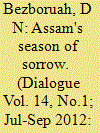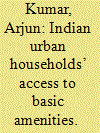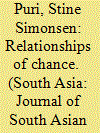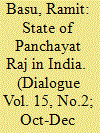|
|
|
Sort Order |
|
|
|
Items / Page
|
|
|
|
|
|
|
| Srl | Item |
| 1 |
ID:
117115


|
|
|
| 2 |
ID:
188405


|
|
|
|
|
| Summary/Abstract |
This article traces the historical roots of contemporary housing struggles in Mumbai, Delhi and Kolkata, emphasising the long-term impacts of post-Partition refugee resettlement. Analysing Partition as a ‘critical event’, we discuss the distinct ways in which local administrators, political leaders and city residents responded to the arrival of hundreds of thousands of refugees, traumatised, impoverished and made homeless by Partition. As they responded, city boundaries were expanded, housing policies were revised and new political repertories were established. Noting both the ruptures and continuities, we present a framework for analysing the impacts of critical events on urban politics and housing rights.
|
|
|
|
|
|
|
|
|
|
|
|
|
|
|
|
| 3 |
ID:
140013


|
|
|
|
|
| Summary/Abstract |
The need for access to basic amenities—drinking water, sanitation, electricity and drainage—to ensure a decent quality of life has been internationally and nationally recognised and acted upon in the form of Millennium Development Goals (MDGs) and various policies and programmes in India. Deprivation and disparities in access to basic amenities in urban India have been highlighted in this article, using data from Census 2001 and 2011 and National Sample Survey’s (NSS) Housing Conditions Rounds unit records data 1993 and 2008–09. Determinants of households having access to basic amenities in the house have been estimated using an econometric exercise on household-level information (NSS, 2008–09). Despite improvement over time, many households in urban India still face deprivations of basic amenities and, hence, low standard of living. Households located in slums and small and medium towns/cities and those belonging to Poor, Scheduled Tribe, Scheduled Caste and Wage Labourers (Casual Labourers) groups were highly deprived of access to basic amenities, and disparities among various socioeconomic groups were observed to be increasing. Findings suggest the need for urgent attention for providing basic amenities, focused on slums, small and medium towns/cities and supplemented with inclusive, group-specific measures in order to raise the overall quality of life and well-being.
|
|
|
|
|
|
|
|
|
|
|
|
|
|
|
|
| 4 |
ID:
123869


|
|
|
|
|
| Publication |
2013.
|
| Summary/Abstract |
This article measures the overall inclusive growth of a city by considering changing trends in key economic variables (that is, poverty, inequality, economic growth, education, employment, unemployment and the standard of living index) based on the 'Borda ranking' and establishes a relationship between city economic growth and overall city inclusive growth. Based on data for 52 large cities in India, this article finds that higher urban economic growth is associated with an increase in the growth rate of urban inequality, a reduction in the growth rate of urban poverty and a lower level of overall inclusive growth of a city, that is, urban economic growth is not inclusive.
|
|
|
|
|
|
|
|
|
|
|
|
|
|
|
|
| 5 |
ID:
144362


|
|
|
|
|
| Summary/Abstract |
This paper examines male friendship at the Delhi racecourse as an example of a sociality amidst an urban South Asian setting defined by uncertainty and the absence of fixed identities. It argues that such friendships are ‘relationships of chance’, embodying and reflecting the contingency of the gambling arena, rather than sociological or ritual notions which may condition friendship in other settings. This hyper-competitive and hyper-social space configures both the possibility and impossibility of friendship. The paper thus provides insights into how relating to others happens in a heterogeneous, fluid context that is over-determined mainly by a shared passion for self-enrichment.
|
|
|
|
|
|
|
|
|
|
|
|
|
|
|
|
| 6 |
ID:
126655


|
|
|
| 7 |
ID:
101041


|
|
|
|
|
| Publication |
2010.
|
| Summary/Abstract |
This article examines the feedback loop between governmental technologies of enumeration and surveillance and Hindu nationalist common sense that creates and sustains what I call "demographic anxiety" about Bangladeshi immigrants and Indian Muslims in the north Indian city of Jaipur. A series of bombings in 2008, rapidly and erroneously attributed to Bangladeshi infiltrators, brought to light the role of these forms of knowledge in struggles over city space and possible urban futures in Jaipur, as well as an incoherent but widespread construction of the demographically aggressive Muslim. I argue that "Bangladeshi" has thus become a mobile signifier that catches up disparate ways of "knowing" local populations. Drawing on personal and research experiences in Jaipur City and newspaper and other media accounts of the bombings, I track the mobilization of this signifier and its material consequences, particularly as they pertain to the fate of Jaipur's "Bangladeshi Basti," which became the site of intense police scrutiny in the aftermath of the bombings. I pay special attention to the ways in which the limits of governmental practices of legibility, such as identity documentation, produce both the will to statistical knowledge and a widespread reliance on common sense that reinforce one another.
|
|
|
|
|
|
|
|
|
|
|
|
|
|
|
|
|
|
|
|
|